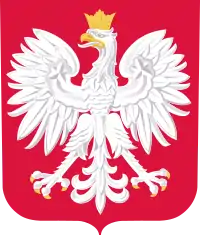Mateusz Morawiecki
Mateusz Jakub Morawiecki (English: Mohra-vetzky; Polish: [mɔraviˈɛtskʲi]; born 20 June 1968) is a Polish economist, historian, and politician who has been the Prime Minister of Poland since December 2017. He previously served in the Cabinet of Prime Minister Beata Szydło as Deputy Prime Minister from 2015 to 2017, Minister of Finance from 2016 to 2018, and Minister of Development between 2015 and 2018. Prior to his political appointment, Morawiecki had an extensive business career.
Mateusz Morawiecki | |
|---|---|
.jpg.webp) | |
| 17th Prime Minister of Poland | |
| Assumed office 11 December 2017 | |
| President | Andrzej Duda |
| Deputy | Piotr Gliński Jarosław Gowin Beata Szydło Jacek Sasin Jadwiga Emilewicz Jarosław Kaczyński |
| Preceded by | Beata Szydło |
| Deputy Prime Minister of Poland | |
| In office 16 November 2015 – 11 December 2017 | |
| Prime Minister | Beata Szydło |
| Alongside | |
| Preceded by | Tomasz Siemoniak Janusz Piechociński |
| Succeeded by | Beata Szydło |
| Minister of Finance | |
| In office 28 September 2016 – 9 January 2018 | |
| Prime Minister | Beata Szydło Himself |
| Preceded by | Paweł Szałamacha |
| Succeeded by | Teresa Czerwińska |
| Minister of Development | |
| In office 16 November 2015 – 9 January 2018 | |
| Prime Minister | Beata Szydło Himself |
| Preceded by | Maria Wasiak |
| Succeeded by | Jerzy Kwieciński |
| Minister of Sport | |
| In office 15 November 2019 – 5 December 2019 | |
| Prime Minister | Himself |
| Preceded by | Witold Bańka |
| Succeeded by | Danuta Dmowska |
| Personal details | |
| Born | Mateusz Jakub Morawiecki 20 June 1968 Wrocław, Poland |
| Political party | Law and Justice (2016–present) Independent (before 2016) |
| Spouse(s) | Iwona Morawiecka |
| Children | 4 |
| Relatives | Kornel Morawiecki (Father) |
| Education | University of Wrocław (BA) Wrocław University of Science and Technology Wrocław University of Economics (MBA) University of Hamburg University of Basel (MAS) |
| Occupation | Economist, historian, magazine editor, politician |
| Signature | |
| Website | www.premier.gov.pl |
Born in Wrocław, Morawiecki became heavily engaged in anti-communist movements in his youth. He attended the University of Wrocław and extended his education at the Universities of Hamburg and Basel. He obtained degrees in arts, business administration, and advanced studies. From 1996 to 2004, Morawiecki lectured at the Wrocław University of Economics, as well as from 1996 to 1998 at the Wrocław University of Technology. From November 1998, Morawiecki worked for Bank Zachodni WBK from the Santander Group, where he was promoted to the position of managing director and eventually chairman.
On 11 December 2017, Morawiecki was nominated as Prime Minister of Poland (premier) by the chief staff of the ruling Law and Justice party.
Early life and education
Mateusz Morawiecki was born 20 June 1968 in Wrocław, southwest Poland, to Kornel Morawiecki, physicist and Fighting Solidarity leader, and his wife Jadwiga. Morawiecki is of distant German descent.[1] The Times of Israel also reported in 2017 that Morawiecki has "Jewish roots", however this claim has not been confirmed.[2]
Morawiecki was active in the Polish anti-communist movement since age 12[3] when he helped in copying underground political literature. In August 1980 he plastered the streets of Wrocław with posters calling for a general strike.[4] After martial law was declared in 1981, he printed and distributed underground Solidarity magazines. In an interview, he said he threw Molotov cocktails at police cars[4] and was on many occasions stopped and beat by Poland's secret police (Służba Bezpieczeństwa, SB). In the 1980s, he edited an illegal political newspaper Lower Silesia Bulletin and was active in the Independent Students' Association. He continued taking part in political demonstrations until the late 1980s and participated in occupation strikes at the University of Wroclaw in 1988 and 1989. He co-organized the Club for Political Thought "Free and Solidary".[5]
Morawiecki is an alumnus of the University of Wrocław (history, 1992), Wrocław University of Technology (1993), Wrocław University of Economics (Business Administration, 1995), the University of Hamburg (European Law and Economic Integration, 1995–97), and the University of Basel (European Studies, 1995–97). While at the Wrocław University of Technology, he studied abroad at Central Connecticut State University and completed an advanced executive program at Northwestern University's Kellogg School of Management.[6][7]
Business career
In 1991 Morawiecki began work at Cogito Company and co-created two publishing firms, Reverentia and Enter Marketing-Publishing. That same year he co-founded the magazine Dwa Dni (Two Days), later becoming editor-in-chief.
In 1995 he completed an internship at Deutsche Bundesbank in credit analysis, financial restructuring, banking supervision, and financial market supervision. In 1996–97 he conducted banking and macroeconomic research at the University of Frankfurt.[8] In 1998, as deputy director of the Accession Negotiations Department in the Committee for European Integration, he oversaw and participated in numerous areas, including finance, of the negotiations for Polish accession to the European Union.
With Frank Emmert, he co-authored the first textbook on The Law of the European Union published in Poland.
From 1996 to 2004 Morawiecki lectured at the Wrocław University of Economics, and from 1996 to 1998 also at the Wrocław University of Technology. He sat on policy committees at many institutions of higher education. From 1998 to 2001 he was a member of the supervisory boards of the Wałbrzych Power Company, Dialog (a local telephone-service provider), and the Industrial Development Agency. From 1998 to 2002 he was a member of the Lower Silesian Regional Assembly.[9]
From November 1998 Morawiecki worked for Bank Zachodni WBK, Santander Group, where he began his career as deputy chair of the supervisory board, and supervisor of the economic analysis bureau and the international trade department. In 2001 he became managing director and a member of the board. In 2007–15 Morawiecki was chairman of Bank Zachodni WBK.[10]
Political career
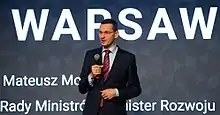
On 16 November 2015, President Andrzej Duda appointed Mateusz Morawiecki as both Deputy Prime Minister and Minister of Development in the Cabinet led by Prime Minister Beata Szydło.[11] (This took place soon after Mateusz Morawiecki's father, Kornel Morawiecki, was elected to Poland's lower chamber of the parliament[12] and the Law and Justice party won the 2015 parliamentary elections.)
In March 2016, Mateusz Morawiecki announced that he had joined the Law and Justice party.
On 28 September 2016, in addition to his other positions, Morawiecki was appointed Minister of Finance, becoming the second most powerful member of the Government, overseeing the budget, government finances, European Union funds, and overall economic policy.[13]
As Finance Minister, Morawiecki outlined an ambitious "Plan for Responsible Development", known colloquially as the "Morawiecki Plan", aimed at stimulating economic growth and raising revenues for generous government plans, including “Family 500+” child benefits for all families with two or more children.[14] In March 2017, he took part in a meeting of G20 finance ministers in Baden-Baden, becoming Poland's first-ever representative at that summit.[15][16]
Prime Minister of Poland (2017–present)
.jpg.webp)
In December 2017, Jarosław Kaczyński, the Chairman of the Law and Justice party, declared that he no longer had confidence in Beata Szydło to be the party's prime ministerial candidate, in part due to perceived conflict between her and other European Union leaders. With her position untenable, Szydło resigned, and Morawiecki quickly won internal party approval to be nominated as her successor. He was sworn in as Prime Minister of Poland on 11 December, immediately appointing Szydło as his deputy.[17] In his first major address to Sejm, he pledged “continuity” rather than radical change.[18]
In January 2018, following a highly public racist incident in Warsaw, Morawiecki declared: "There is no place in Poland for racism. The attack on a girl because of her skin color deserves the strongest condemnation. We shall do everything to make Poland safe for everyone."[19]
In early 2018, both chambers of the Polish parliament (the Sejm and Senate) adopted an Amendment to the Act on the Institute of National Remembrance criminalising the ascription to Poles collectively of complicity in World War II Jewish-genocide-related or other war crimes or crimes against humanity that had been committed by the Axis powers, and condemning use of the expression, "Polish death camp".[20][21][22] The law sparked a crisis in Israel–Poland relations.[23]
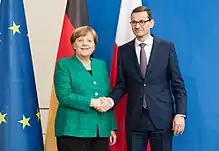
At the Munich Security Conference on 17 February that year, Morawiecki said "it is not going to be seen as criminal to say that there were Polish perpetrators, as there were Jewish perpetrators, as there were Russian perpetrators, as there were Ukrainian perpetrators, not only German perpetrators."[24][25] His remark roused controversy and prompted criticism by prominent Israeli politicians, including Israeli Prime Minister Benjamin Netanyahu[26][27] and Israeli President Reuven Rivlin.[28] The crisis was resolved in late June that year when the Polish and Israeli prime ministers issued a joint communiqué endorsing research into the Jewish Holocaust and condemning the expression, "Polish concentration camps".[29]
In March 2018 a new Polish law took effect, banning nearly all commerce on Sundays, with supermarkets and most other retailers closed Sundays for the first time since liberal shopping laws were introduced in the 1990s. The law had been passed by the Law and Justice party with Morawiecki's support.[30][31][32][33]
.jpg.webp)
As other Visegrád Group leaders, Morawiecki opposes any compulsory EU long-term quota on redistribution of migrants. In May 2018, Morawiecki said: "Proposals by the European Union that impose quotas on us hit the very foundations of national sovereignty."[34]
In July 2018 Morawiecki said he "will not rest" until "the whole truth" of the World War II-era massacres in Volhynia and Eastern Galicia have been explained. Between 1942 and 1945, members of the Ukrainian Insurgent Army (UPA) killed up to 100,000 civilians in nowadays Western Ukraine.[35][36]
On the issue of Brexit, Morawiecki told the BBC in January 2019 that more and more Polish people are returning to Poland from the UK and he hoped the trend would continue to help boost the Polish economy.[37]
In January 2019 Morawiecki said that "Hitler's Germany fed on fascist ideology... But all the evil came from this (German) state and we cannot forget that, because otherwise we relativise evil."[38]
Od 15 September 2020, Wojewódzki sąd administracyjny (administrative court) (pl:Wojewódzki sąd administracyjny) in Warsaw ruled that the decision of Prime Minister Mateusz Morawiecki to hold the elections only by postal vote on 10 May 2020 was a "gross violation of the law and was issued without [legal] grounds" and violated article 7 of the Polish Constitution, article 157, paragraph 1 and article 187, paragraph 1 and 2 of the Electoral Code.[39] The opposition demanded Morawiecki's resignation.[40]
Other posts
- Ex-officio member, Board of Governors, Asian Infrastructure Investment Bank (AIIB)[41]
- Ex-officio member, Board of Governors, International Monetary Fund (IMF)[42]
Honours
In 2008 Morawiecki was made Honorary Consul of the Republic of Ireland in Poland. In 2013 he was awarded the Cross of Freedom and Solidarity. In 2015, he became the recipient of the Knight's Cross of the Order of Polonia Restituta.[10] In 2019, he was awarded the title Man of the Year at the annual Krynica Economic Forum.[43] He has also received other distinctions from economic clubs, universities, publishing houses, and cultural institutions.
Personal life
Morawiecki is married to Iwona Morawiecka, with whom he has four children: two daughters (Olga and Magdalena) and two sons (Jeremiasz and Ignacy).[44][45]
Two of his aunts married Jewish men and converted to Judaism. One aunt was saved during the Jewish Holocaust by a Righteous among the Nations.[46]
State-visits gallery
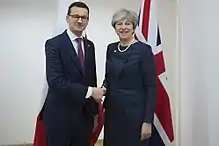
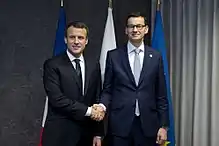 Morawiecki with Emmanuel Macron, Brussels 2017
Morawiecki with Emmanuel Macron, Brussels 2017.jpg.webp)

.jpg.webp)

References
- "Rodzinna lustracja premiera". Wprost. February 11, 2018.
- JTA (8 December 2017). "Poland appoints ex-banker with Jewish roots as prime minister". Times of Israel. Retrieved 8 November 2019.
- "Kim jest kandydat na premiera Mateusz Morawiecki [SYLWETKA]". www.gazetaprawna.pl.
- WPROST.pl (2020-02-11). "Morawiecki o czasach PRL: Rzucałem koktajlami Mołotowa (...) do tej pory koledzy wspominają moje poranione plecy". Wprost (in Polish). Retrieved 2020-02-18.
- ""W domu nigdy o tym nie opowiadał. Nie chciał martwić matki". Dzieciństwo premiera wspomina jego mama". Retrieved 5 October 2019.
- "Mateusz Morawiecki". Retrieved 5 October 2019.
- "Mateusz Morawiecki". Retrieved 5 October 2019.
- "Mateusz Morawiecki". Retrieved 5 October 2019.
- "I Kadencja Sejmiku Województwa Dolnośląskiego". Retrieved 5 October 2019.
- "Mateusz Morawiecki". Retrieved 5 October 2019.
- "Oficjalna strona Prezydenta Rzeczypospolitej Polskiej / Aktualności / Nominacje / Prezydent powołał rząd". 2015-11-16. Archived from the original on 2015-11-16. Retrieved 2019-07-21.
- "Kornel Morawiecki". sejm.gov.pl. Retrieved 2019-07-21.
- "Polish reshuffle puts sights on prime minister". POLITICO. 29 September 2016. Retrieved 21 October 2016.
- "Trillions needed to modernise Poland: deputy minister". Radio Poland. 30 September 2016. Retrieved 21 October 2016.
- "Morawiecki wśród ministrów finansów G20 - Gospodarka - rp.pl". Retrieved 2017-03-31.
- "Rzeczy, które musisz wiedzieć o szczycie G20 | Ze świata". TVN24 BiS (in Polish). Retrieved 2017-03-31.
- "Komitet Polityczny PiS desygnował Mateusza Morawieckiego na Premiera". Prawo i Sprawiedliwość. Retrieved 7 December 2017.
- Michał Broniatowski (December 12, 2017), Poland’s new PM won’t change anything after leadership swap Politico Europe.
- "No place for racism in Poland, says PM after attack on teen". Radio Poland. Retrieved 7 January 2018.
- Israel and Poland try to tamp down tensions after Poland’s ‘death camp’ law sparks Israeli outrage, Washington Post, 28 January 2018
- Israel and Poland clash over proposed Holocaust law, Reuters, 28 January 2018
- The Controversy Around Poland’s Proposed Ban on the Term “Polish Death Camps”, Smithsonian.com, 29 January 2018
- News, ABC. "The Latest: Party head: Israel confirms Polish view on Nazis". ABC News. Retrieved 2018-07-07.
- ""Jewish perpetrators" remark reignites Poland Holocaust dispute". CBS News. 19 February 2018.
- "Polish MP: I hope my prime minister is being stupid and not ruthless". The Jerusalem Post. 19 February 2018.
- ""Jewish perpetrators" remark reignites Poland Holocaust dispute". Retrieved 2018-07-07.
- "Benjamin Netanyahu attacks Polish PM for saying Jews were among perpetrators of the Holocaust". The Independent. 18 February 2018.
- "Polish Embassy in Israel Vandalized After Polish PM's Controversial Remarks". VOA News. 18 February 2018.
- "The Latest: Party Head: Israel Confirms Polish View on Nazis". Retrieved 2018-07-07.
- https://www.usnews.com/news/business/articles/2018-03-11/most-stores-shut-in-poland-as-sunday-trade-ban-takes-effect
- "Stores shut across Poland as Sunday shopping ban takes effect". Global News.
- "Sunday trading ban comes into effect in Poland". March 11, 2018 – via www.rte.ie. Cite journal requires
|journal=(help) - "Stores closed as Poland phases out Sunday shopping". Polskie Radio dla Zagranicy.
- "Refugee quotas 'hit foundations of national sovereignty': Polish PM". Radio Poland. 14 May 2018.
- "Polish PM pledges to fight for 'whole truth' of WWII massacres". Radio Poland. 11 July 2018.
- "Ukrainian nationalists plan protests against Polish anti-defamation law". Radio Poland. 5 February 2018.
- Geoghegan, Ian (January 24, 2019). "Polish PM to UK: 'Give us our people back'". POLITICO.
- "Polish PM says Hitler's Germany responsible for Holocaust, not Nazis". France 24. 27 January 2019.
- "Sąd uchylił decyzję premiera w sprawie wyborów kopertowych. "Rażąco narusza prawo, wydana bezpodstawnie"". tvn24.pl. 15 September 2020. Archived from the original on 15 September 2020.
- ""Oczekujemy dymisji premiera". Opozycja po wyroku ws. wyborów 10 maja". polsatnews.pl. 15 September 2020. Archived from the original on 15 September 2020.
- Board of Governors Asian Infrastructure Investment Bank (AIIB).
- Board of Governors International Monetary Fund (IMF).
- "Forum Ekonomiczne w Krynicy-Zdroju. Mateusz Morawiecki z nagrodą Człowieka Roku". Retrieved 5 October 2019.
- "Wyborcza.pl". wroclaw.wyborcza.pl.
- "Oto rodzina Morawieckiego. Uchylamy rąbka tajemnicy!". Retrieved 2017-12-09.
- Poland appoints ex-banker with Jewish roots as prime minister By JTA, 8 December 2017
External links
| Political offices | ||
|---|---|---|
| Preceded by Janusz Piechociński |
Deputy Prime Minister of Poland 2015–2017 |
Succeeded by Beata Szydło |
| Preceded by Maria Wasiak |
Minister of Development 2015–2018 |
Succeeded by Jerzy Kwieciński |
| Preceded by Paweł Szałamacha |
Minister of Finance 2016–2018 |
Succeeded by Teresa Czerwińska |
| Preceded by Beata Szydło |
Prime Minister of Poland 2017–present |
Incumbent |
| Preceded by Witold Bańka |
Minister of Sports and Tourism 2019 |
Succeeded by Danuta Dmowska |
